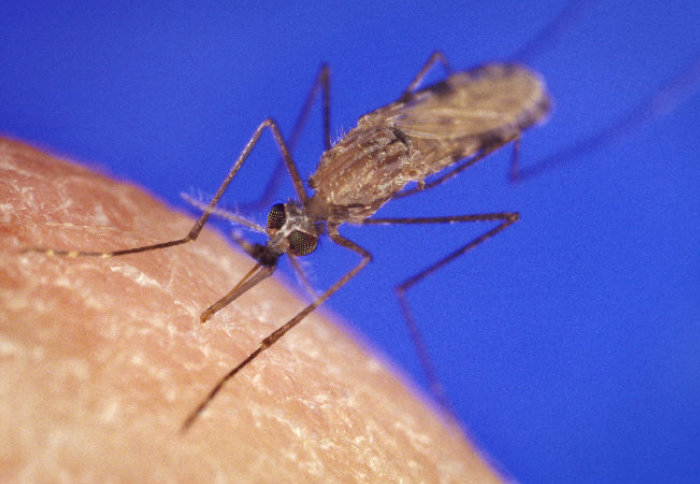Female mosquitoes that have mated are more likely to transmit malaria

Hormones received from male mosquitoes during mating boost the likelihood of female mosquitoes transmitting malaria to people.
Only female mosquitoes bite humans and pass on malaria. However, the new study shows that males can also influence malaria transmission, by making mated females more likely to pass on the parasites.
Our study shows that targeting mosquito reproduction could have an extra impact beyond simply controlling the population numbers of mosquitoes. Dr Farah Dahalan
This means that interventions that target males could help reduce malaria cases by leaving fewer males available for mating.
The new research, published today in PLOS Pathogens, was led by a team of researchers from Imperial College London and the Wellcome Sanger Institute.
Malaria kills more than 400,000 people and infects more than 200 million people worldwide every year. It is caused by a parasite, Plasmodium falciparum, which spends part of its life in the midgut of certain mosquito species.
When female mosquitoes take a blood meal from a person, these parasites can then be transferred, passing the disease on.
Now, the research team have discovered that hormones transferred to the females during mating cause changes in their midgut that make them more susceptible to the parasites, meaning they are also more likely to pass them on when biting humans.
Added impact
Lead author of the study Dr Farah Dahalan, from the Department of Life Sciences at Imperial, said: “Many methods of controlling malaria rely on targeting the mosquitoes as vectors of the disease. However, mosquitoes have evolved resistance to most classes of insecticides, so new ways of controlling them are urgently needed.
“Our study shows that targeting mosquito reproduction could have an extra impact beyond simply controlling the population numbers of mosquitoes – it could have the added effect of making females less susceptible to the parasites as more of them remain virgins.”
The team investigated mosquitoes in the Anopheles gambiae group of mosquito species, which are responsible for the majority of malaria infections in Africa, where the most deaths occur.
Knowing that males affect malaria transmission in this previously unappreciated way could encourage new interventions that target mating. Dr Mara Lawniczak
During mating, females receive a plug of material from the male that contains a hormone called 20-hydroxyecdysone (20E), which affects egg production.
The team found that increased 20E also affects the susceptibility of the female to the malaria parasite colonizing their midgut. They tested this by injecting virgin females with 20E and evaluating their susceptibility to the parasite, which was found to be similar to that of mated females.
Further analysis showed that 20E causes changes to genes in the midgut, affecting the mosquito’s susceptibility to parasites.
Lead researcher Dr Mara Lawniczak, from the Wellcome Sanger Institute and the Department of Life Sciences at Imperial, said: “Knowing that males affect malaria transmission in this previously unappreciated way could encourage new interventions that target mating.”
-
‘The male mosquito contribution towards malaria transmission: mating influences the Anopheles female midgut transcriptome and increases female susceptibility to human malaria parasites’ by Farah Aida Dahalan, Thomas S. Churcher, Nikolai Windbichler and Mara K. N. Lawniczak is published in PLOS Pathogens.
Article supporters
Article text (excluding photos or graphics) © Imperial College London.
Photos and graphics subject to third party copyright used with permission or © Imperial College London.
Reporter
Hayley Dunning
Communications Division